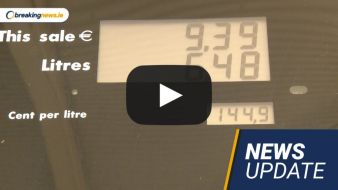Exports increase
Ireland’s unadjusted exports of goods were €18 billion in May 2022, an increase of almost €4.5 billion with May last year, according to figures released from the Central Statistics Office (CSO).
The increase of exports were largely due to the medical and pharmaceutical sector as exports of medical and pharmaceutical products increased by 63 per cent in May 2022 from €2.7 million to €7 million.
The exports of this sector represented 39 per cent of the total exports.
Hospital abuse
The Irish Nurses and Midwives Organisation (INMO) has called for increased security across all areas of hospital campuses after a large rise in assaults on nurses.
This comes as figures reveal that over five nurses were physically, verbally or sexually assaulted a day in the month of June.
In 2021, the Health and Safety Authority (HSA) recorded 7,477 inspections but only 446 inspections in health and social care settings, compared to 2,865 in construction.
European heatwaves
Europe’s recent spate of wildfires have abated amid cooler temperatures with no outbreaks reported in Portugal while French firefighters started to get the upper hand over two major blazes and Spain tamed a fire that killed two people.
Spanish firefighters were tackling nine blazes, with two said to be especially dangerous in north-western Galicia.
Some of the 11,000 people evacuated because of the fires in Spain began returning home, and a major highway in the north-western Zamora province reopened after two days.
Greenhouse gas levels
Ireland's greenhouse gas emissions increased by 4.7 per cent last year compared to 2020 and are now 1.1 per cent higher than pre-pandemic levels, according to the Environmental Protection Agency (EPA).
Although 2020's figures were notably lower than previous years due to Covid-19 restrictions, 2021's emissions saw a concerning increase.
Emissions from the energy industries noted a 17.6 per cent rise last year, driven mainly by a tripling of coal and oil use in electricity generation.
Car prices
Car prices are now 63.7 per cent more than they were just before the onset of Covid-19, with the annual rate of inflation at 29 per cent year-on-year, according to DoneDeal's Car Price Index.
The report, by economist Dr Tom Gillespie, also found prices showed signs of stabilisation.
In the two years since the pandemic began, prices rose consecutively by an average of 5.9 per cent per quarter.
In the two years prior to the pandemic, the average quarterly rate of inflation was just 0.8 per cent. As of Q2 2022, prices are now 63.7 per cent more than they were just before the onset of Covid-19.
New UK Prime Minster
The EU is hopeful a change in UK prime minister will herald a “new start” in relations between Brussels and London, Minister for Foreign Affairs Simon Coveney has said.
Mr Coveney said he does not have a preference between Liz Truss or Rishi Sunak in the Conservative leadership contest.
However, he expressed hope that whoever succeeds Boris Johnson steps away from the contentious move to override Brexit’s Northern Ireland Protocol by way of domestic legislation at Westminster.
Mr Coveney was speaking in Belfast ahead of meetings with local politicians to discuss the ongoing power-sharing impasse at Stormont triggered by the DUP’s refusal to re-enter the executive in protest over post-Brexit trading arrangements.
Interest rates
The European Central Bank (ECB) will raise interest rates for the first time in 11 years on Thursday with a bigger-than-flagged move seen as increasingly likely as policymakers fear losing control of runaway consumer price growth.
With inflation already approaching double-digit territory, it is now at risk of getting entrenched above the ECB's 2 per cent target, requiring rate hikes even if that slows - or crashes - an economy already suffering from the impact of Russia's war in Ukraine.
But policymakers appear far from united on just how fast the ECB should move with some arguing that it is already a long way behind the curve, especially compared to global peers like the US Federal Reserve, while others point to a looming recession the ECB risks exacerbating.
In-patient charges
Legislation to abolish in-patient charges for children in public hospitals and the introduction of free contraception for women aged 17-25 has been signed into law by President Michael D Higgins.
The Act will provide for the abolition of both overnight and day case public in-patient charges for children under 16 in all public hospitals, and remove the existing acute statutory in-patient charge of €80 per night.
The two measures are scheduled to come into operation by early September.
The contraception scheme will cover the full cost of prescription contraception, including the cost of consultations and the cost of fitting and removing various types of contraception.
It will also cover the cost of the contraception itself, including contraceptive injections, implants, IUS and IUDs (coils), the contraceptive patch and ring, and various forms of oral contraceptive pill, including emergency contraception.






